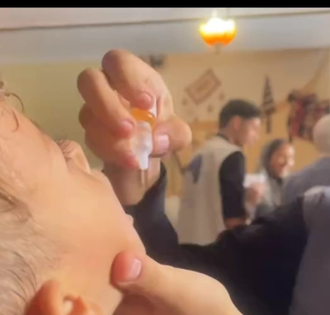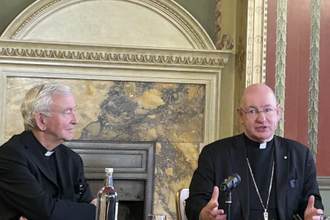Gaza: CAFOD partner's vital Polio vaccination work stalled

Child receives first vaccination - Caritas Jerusalem
Source: CAFOD
The risk of death from hunger or disease in high in Gaza - especially among the youngest and most vulnerable. Contrary to media reports some help IS getting through, but the timing is critical, and the ongoing conflict is hampering efforts to bring protection and relief.
After surviving more than a year of conflict, children trapped in Gaza need urgent medical intervention, to reduce the spread of life-threatening diseases like polio.
The first round of the UN's polio vaccination programme was successfully completed in August, after Israel agreed to a brief, temporary ceasefire, to allow the scheme to go ahead. But tragically, the latest round of the programme has had to be postponed by the World Health Organisation, due to the lack of safety for child participants and their families, as well as healthcare workers.
A polio vaccine is most effective when a second dose is administered, around 4-6 weeks after the first.
The critical time for that vital second dose is now.
"Having a significant number of children miss out on their second vaccine dose will seriously jeopardize efforts to stop the transmission of poliovirus in Gaza. This could also lead to further spread of poliovirus in the Gaza Strip and neighbouring countries, with the risk of more children being paralyzed." said a WHO spokesperson.
The timing of the postponement could not be more poignant - 24th October 2024 is World Polio Day, when public health advocates, and all those striving for a world free from this crippling disease, come together to recognize global progress in the fight to rid the world of polio for good.
"Caritas Jerusalem's emergency medical teams did incredible work to help vaccinate children with the first dose and have been critical in providing essential healthcare amidst the conflict." said Elizabeth Funnell, CAFOD's Country Programme Representative in the Middle East.
"Despite the destruction of several healthcare facilities and restricted access due to ongoing hostilities, CJ's medical teams have continued to operate in Gaza's most affected areas, through 17 medical teams."
More than 560,000 children were vaccinated against polio during the first phase and our church partners were working to deliver the second round - predominantly in the Deir al Balah area. Most of the team have themselves been displaced, having to leave everything behind, but their dedication to the work was unwavering.
Ahmad Daya, from the team in Gaza told us: "Thank God we work at Caritas, allowing us to serve people in the most challenging conditions. This organization helps us make our voices heard, which has brightened our days. We hope for an end to the war, suffering, and displacement so we can return to our homes, neighbourhoods, streets, and everything we once knew."
A week ago CAFOD joined with 14 other leading UK aid charities in launching the DEC Middle East Humanitarian Appeal, to raise vital funds to help those across the region who are suffering. As part of their work in Gaza, CAFOD's partners were working to support the polio vaccination programme, alongside other DEC members, and the World Health Organisation.
Another of CAFOD's partners, also in Gaza, described the desperate situation and called for urgent change, saying people there are exhausted after more than a year of conflict: "Every day people are killed, burned, or die from hunger. We want to see a small light of hope, but it is not there. It's over a year now and it's getting worse. We keep experiencing same trauma day after day."
"I remember last year, we lived on canned food for a while. Today we are living on canned food [permanently]. We are all sick, but we have to go on - it is about fairness and justice. We appreciate all the efforts from CAFOD and from people around the world, but change is what we need, and that's what we're not seeing."
Millions across the Middle East have fled their homes in search of safety over the past 12 months. Gaza is on the brink of famine. 86% of the population (1.84 million people) are experiencing acute food insecurity.
CAFOD and other DEC member agencies have been working alongside communities in the region for many years, supporting local organisations on the ground.
Donations made to the DEC Middle East Humanitarian Appeal will go towards supporting families who are living with hunger and disease, as well as injuries caused by the conflict, in an intensely challenging context.
Donations to the DEC Appeal can be made at: https://cafod.org.uk/give


















